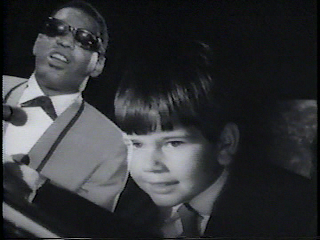
(aka Blues For Lovers) 1964 / Black & White / 95 min.
Directed by Paul Henreid / Story by Henreid / Written by Burton Wohl
Starring: Ray Charles (as himself) / Tom Bell (Steve Collins) / Mary Peach (Peggy Harrison) / Piers Bishop (David) Produced by Herman Blaser Executive Producers: Alexander Salkind & Michael Salkind (as Miguel Salkind)
Original Music by Ray Charles
Cinematography by Robert Huke (as Bob Huke)
Directed by Paul Henreid / Story by Henreid / Written by Burton Wohl
Starring: Ray Charles (as himself) / Tom Bell (Steve Collins) / Mary Peach (Peggy Harrison) / Piers Bishop (David) Produced by Herman Blaser Executive Producers: Alexander Salkind & Michael Salkind (as Miguel Salkind)
Original Music by Ray Charles
Cinematography by Robert Huke (as Bob Huke)

SYNOPSIS:
While performing in Swinging Sixties London with his band, Ray Charles befriends fan and blind English boy, David. Feeling a kinship, Ray arranges for David to see a top eye specialist in Paris and invites his father (Tom Bell) to be his arranger on his European tour which includes a stop in Paris. Ray performs: Let the Good Times Roll, Lucky Old Sun, Talking About You, Cry, What'd I Say, Unchain My Heart, Hit the Road Jack, I Got a Woman, Careless Love and Light Out of Darkness.

REVIEW
Ballad In Blue is a formulaic sixties “pop” movie where the drama serves as an excuse for the musical showcases. Ray, his band and his singers The Raelettes are in top form performing such hits as Let the Good Times Roll and Unchain My Heart, which Bob Huke superbly photographs in black-and-white. Easily, the music is the main attraction here.

Though by no means an actor, Ray's presence is enough to forgive the film's overall corniness and plot contrivances. Take for instance, Ray teaching a classroom of English kids Hit The Road Jack. Sure it's cute, but it's charming because of Ray.
 The story and characters are hokey. Shots of the boy's face superimposed over Ray's performances are so sugary that they induce a diabetic attack in the viewer. (Okay, we get the point already.)
The story and characters are hokey. Shots of the boy's face superimposed over Ray's performances are so sugary that they induce a diabetic attack in the viewer. (Okay, we get the point already.)
The cast surrounding Ray is mediocre, though to be fair they're not working with great material. Their characters remain two-dimensional throughout. David's father, especially, is rarely sympathetic as a struggling musician trying to keep his family together. Why would Ray help him?

WHY A HOLY GRAIL?
For the performances, clips of which have been reproduced in documentaries about Ray.
For the rarity of seeing Ray act. Aside from guest appearances on Saturday Night Live, The Muppets, the eighties TV series, St. Elsewhere, and a cameo in 1980's Blues Brothers, this is the only substantial acting performance by Ray Charles.

AVAILABILITY:
To the best of my knowledge, Ballad In Blue has never been available on legitimate DVD, not even after the death of Ray in 2004. A search of the internet may yield one or two unofficial outlets selling it, but these are likely sourced from the long out-of-print VHS. The quality of that tape is surprisingly crisp, both in video and mono sound, in 4:3 aspect ratio. Quantities of this VHS are rare. In the mid-90s Bravo aired Ballad In Blue a few times on North American TV, while copies of the VHS were found primarily in specialty video rental shops.
I don't know who owns the rights to this film, though I'm confident that there is a market for this film, given the popularity of Ray Charles and the number of posthumous CD and DVD releases. I mean, if a slew of Elvis' lousy Hollywood movies are available on the open market why not one of Brother Ray's?

TRIVIA:
Executive producers, the Salkinds, would go on to produce the Superman films.
Director Paul Henreid played Laszlo in Casablanca.
As the film was released around the world, Ray would be busted for heroin possession and go through detox. At the height of his popularity, Ray was one of a handful of musicians who truly owned and controlled his music.

No comments:
Post a Comment